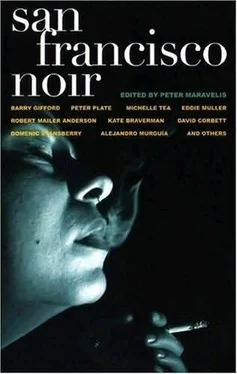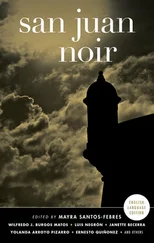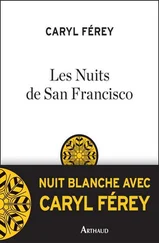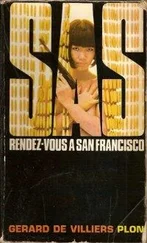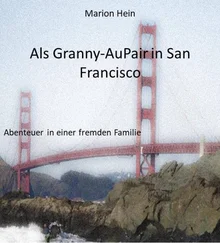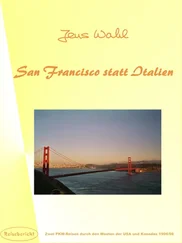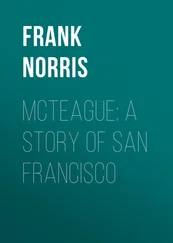Clarissa and Zoë no longer hold hands. A distance of texture and intention forms between them. The geometry is calculated. Not even their shadows collide.
“Another bittersweet reunion barely survived,” Clarissa says. “My beloved cousin.”
“And you, my first and greatest love,” Zoë says. “Another high-risk foray we deserve purple hearts for.”
“We’ll get red hearts around our names next time. Our next tattoo,” Clarissa smiles.
They kiss on both cheeks. The glitter has departed from their eyes. They have slid into an interminable foreign film neither of them has interest or affection for. She knows the name of Clarissa’s lipstick now. It’s called Khmer Rouge.
There is a certain pause just before sunset, when the bay is veiled in azure.
It’s the moment of redemption or drowning. Inland, cyclone-fenced freeways carve cement scars beside bungalows with miniature balconies where parched geraniums decay in air soiled from the fumes of manufacturing and human wounds. The bay is a muted defeated blue, subjugated and contained. At night, they pump the antidepressants in. Or maybe there’s enough Prozac and beer already in the sewage. Pollution turns the setting sun into strata of brandy and lurid claret, smears of curry and iodine. It looks like a massacre.
“My car can take you where you’re going,” Clarissa offers.
Clarissa’s driver has short hair, a thick neck, sunglasses with an ear attachment she imagines CIA field operatives employ. Clarissa indicates the car door. It is open like a dark mouth with the teeth knocked out. And she’s waving the purple scarf like a banner. Zoë refuses to admit that she doesn’t know where she’s going. She turns away and starts walking. If those are words issuing from Clarissa’s mouth, which needs immediate surgical attention, Zoë can’t hear them. There are shadows along the boardwalk now, in the alleys and sides of residential streets with ridiculous, insipid seaside names. Bay Street. Marine Drive. North Point View. Who do they think they’re kidding?
Keep walking and shadows find you. They are the distilled essence of all harbors and bays. Such shadows taste like a wounded sherry you can drink or pour on your cuts. Use them for bath oil and become immune to infection. Shadows are graceful and do not require explanations. They know you are more dangerous than they imagine. They cannot fill in your blanks. Simply surrender and they do everything.
There are no neutral zones. They’re an illusion, a delu-sionary construct, like movie and real-estate contracts. Satellites map each zip code and tap every telephone. Cities are enclaves between combat arenas. We are born with weapons of mass destruction. They’re in our genes, passed down the generations, like poisonous heirlooms. It’s ground zero now and forever. Zoë senses the car moving behind and away from her, and she is grateful. She never wants to see Clarissa again.
LE ROUGE ET LE NOIR BY ALVIN LU
Chinatown
For K & T
Face à face avec la profondeur, l’homme, front penché, se recueille.
Que voit-il au fond du trou caverneux? La nuit sous la terre, l’Empire d’ombre.
– Victor Segalen
T he young people in Chinatown are afraid and confused. We don’t know what to do with our lives, ” Michael Munroe read in the February 1970 issue of Getting Together , a mimeographed newsletter published by I Wor Kuen, a Chinatown-based anti-imperialist group somewhat ludicrously named after the late-nineteenth-century Chinese secret society whose members believed mystic rituals and spirit possession would make them invulnerable.
Three years out of Princeton, Michael had thrown in with the revolution. He had turned his back on a life of privilege, by any standard, and left his home in Illinois for the West Coast.
He worked as a postman in the East Bay, inside a stretch of black neighborhoods, and organized there. Recently he had been coming across the bridge to discuss tactics with another postal organizer, Francis Chao. Organization was effective in the post office. The P.O. had a high percentage of black workers, who in those days were highly politicized.
Meeting Francis in Chinatown, coming from the East Bay, was an abrupt transition. Walking routes in West Oakland, Michael felt he had miraculously made the great leap from one world to another; his role as deliverer of welfare checks afforded him access to ordinary black lives few white men experienced. But Chinatown was different. There were a few of the cadre there, both American- and foreign-born, who could move, not always with ease, through that underground world, an entirely other country only two blocks wide extending from Bush to Broadway, and they offered Michael glimpses of how it worked. Francis was one of them.
The struggle for Chinatown’s soul between Kuomintang and CPC (Communist Party of China) sympathizers was then at its peak. IWK and Wei Min She (literally, the “Serve the People” Association) opened storefronts in the basement of the International Hotel, located in Manilatown on the corner of Jackson and Kearny Streets, and plotted to overthrow the power structure. Radical activists, propelled by Third World strikes at San Francisco State and Berkeley, descended on the bewildered community, some of them calling themselves Red Guards, talking about Yellow Soul. Politics in turn exacerbated already existing petty rivalries between American-born and foreign-born gangs. A pool hall-soda fountain run by a group of reformed American-born at 615 Jackson was adorned with posters of Huey P. Newton and Mao Tse-tung, while a large gang known as the Jo-Boys amounted to strongarms for the tongs, who continued to assert their fading influence.
What all these groups, including the ruling Six Companies oligarchy, fought to represent could be narrowed down to one square block, Portsmouth Square, in the heart of the community, which had been recently defaced by stenciled graffiti bearing the image of Chiang Ching. It was the site of innocuous fairs, well-meaning rallies, and, increasingly, conflicts. One could imagine, in the years of the Barbary Coast, when it was the makeshift center of San Francisco’s gambling traffic, a gallows being erected there. But most of the time now, it was just the immortal old men, playing Chinese chess or a variation on bridge. Some nights, the fog would stroll down the hills of Washington and Clay Streets, you could hear the foghorns, and the Stockton bus would roll up. No one knew the future.
Michael and Francis regularly met at the Hunan Cafe, across the street from the I-Hotel, but the atmosphere there had grown too thick with intrigue, and Francis suggested a little-known restaurant elsewhere, frequented entirely by locals who spoke only in Toisan dialect. The two of them were to meet an acquaintance of Francis’s there, who was researching a documentary film on the nascent Asian-American “movement” and wanted to interview Francis incognito.
Francis wore a blue Mao tunic, jeans, and black kung-fu shoes. He was clean-shaven, and a helmet of straight hair covered his ears. Though smallish, he projected confidence and power-rumor had it that he was a black belt, and even Michael, who was a big man and a star college lacrosse player before he blew out his knee, felt tough walking beside him. The two of them, as members of the rather rigidly Maoist Revolutionary Union, worked closely with WMS, their Chinatown affiliate, and tended to regard IWK, who after all were from New York and were behind the curve that way, as suspiciously reformist. Nevertheless, at this optimistic time, there was still hope a united front could be built in Chinatown.
“I hear you’re going to be sent somewhere,” Francis said.
“Where?”
Читать дальше
